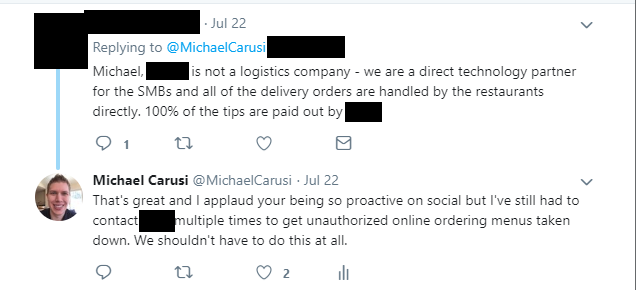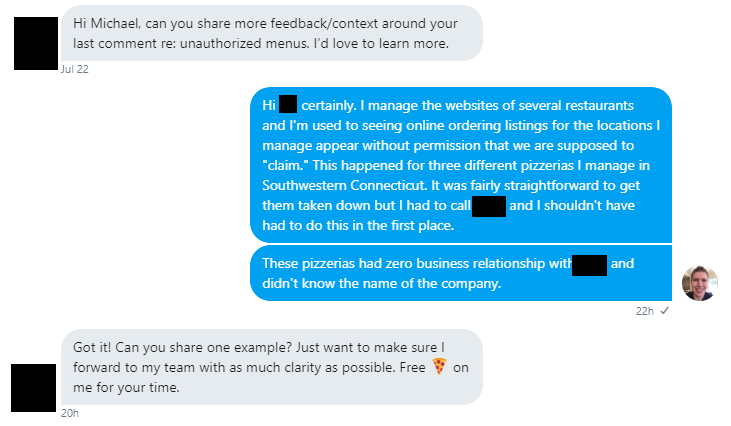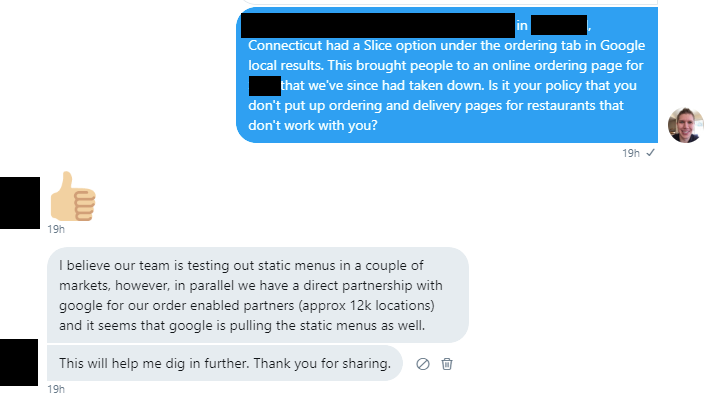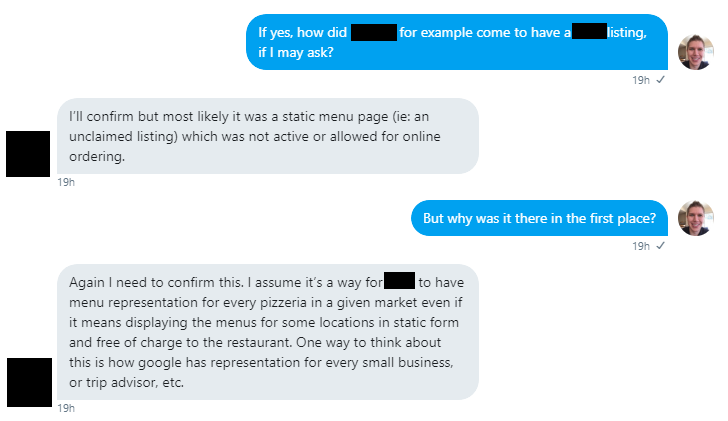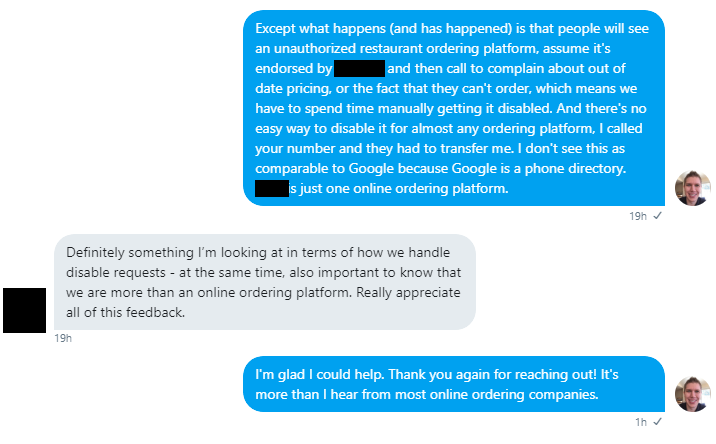I recently published a lengthy article on my increasing dissatisfaction with the behavior of online food delivery companies. I’ve been an increasingly regular critic of what I see as duplicitous, protectionist and downright shady methods of acquiring and retaining clients. Most recently we have DoorDash under fire for essentially stealing tips from delivery workers and it seems like every week there’s a new scandal.
My biggest gripe has been the unauthorized “claimable” restaurant listings that restaurants have to spend valuable time removing because they’re not interested in using them. Somewhat to my surprise a CEO of one of the companies I namechecked responded to me on social media. After privately messaging me he asked about my concerns and I relayed them, resulting in a civil conversation. I will not be naming the CEO nor the company he was representing, but some of his comments did feel worth addressing in the context of this blog.
The CEO’s initial comment was a response to my claim that I was tired of the shadiness of various online delivery companies, though I namechecked his company in the context of the online menus. I didn’t actually accuse this particular delivery company of stealing tips, but fair enough, I can see how he would have made that assumption.
His other comment is…odd. So you’re not a logistics company, you’re a “direct technology partner.” Aren’t logistics companies basically direct technology partners? Isn’t delivery part of logistics? The company’s own website readily discusses its own commitment: “(Company) lets you instantly order real pizza, pasta, sides, and more from your favorite local pizzeria. Browse menus, get exclusive deals, and reorder all in a tap.” So this feels like a distinction without a difference.
After I replied to the CEO with my own comment, he direct messaged me.
Author’s note: I meant that I manage the websites of the pizzerias. I don’t moonlight as a pizza maker. Yet, anyway.
As much as free pizza is awesome, this confused me. I didn’t point this out at the time but the process of setting up claimable online ordering platforms is so widespread and so specific to many online ordering companies that doing it by mistake or accident seems extremely unlikely.
As it happens, when I called this company to remove my clients’ unauthorized ordering menu listings the service rep had an interesting explanation. He said to me at the time that they had put the menus up because they had received feedback from the customers of my pizzeria clients that they wanted to see listings for the company.
Not to be mean, but the prospect of local pizzeria customers going out of their way to specifically request online ordering functionality through a specific, comparatively smaller delivery company (albeit one with a $15 million GGV Capital round) seems just as unlikely. This is also contradicted by something the CEO himself later says, but we’ll get to that. I provided him his requested example.
I subsequently specifically asked if it’s their company policy to not put up claimable online ordering menus for restaurants they don’t work with. A thumbs up emoji…kind of indicates yes? He could just be voicing his approval of the example I provided. So his response to my question isn’t a no, but it’s not a yes either.
So okay, they’re static testing menus. I pressed a little about how the example pizzeria I provided had any listing on the ordering service since they had zero relationship of any kind with the company itself.
This is where he started getting, in my opinion, a bit evasive. I’ve been on enough rodeos to know that “I’ll confirm this” is usually a way to hedge your statements so that you don’t give out concrete answers. It sets up a scenario where you didn’t know all of the facts when you first answered in case anything else comes to light. It also feels a little strange that a CEO wouldn’t know about such a recurring practice of his own company.
This is also where his explanation gets sticky. At the onset this reason for a non-affiliated pizzeria having a listing on the company contradicts the reason provided by the customer service representative I mentioned earlier. The fact that the CEO is also assuming the reason feels like another instance of hedging his statement.
As for the reason itself, this feels like a case of unwanted assistance. As someone who deals with unauthorized menu listings very frequently, what happens (and has happened) is that people will see an unauthorized restaurant ordering platform through a Google search, assume it’s endorsed by the restaurant, and then call to complain about out of date pricing, or the fact that they can’t order.
This means that the restaurant has to field unnecessary phone calls or E-mails during the worst possible time: Busy lunch or dinner services, which is when people would most likely be ordering in the first place. It also means that restaurants and their associates (in this case, me) have to spend time manually getting the unwanted listings disabled.
I should mention that there’s very rarely a way to easily disable unwanted online menus for almost any ordering platform. In the case of this company I called them and had to be transferred. For another company I had to send an E-mail and wait two weeks for a response, and I already detailed the ordeal that was getting menus off of GrubHub.
The comparison to Google having representation for every small business also feels off the mark. As a search engine Google is an index of the Internet’s information directory. It’s where people would naturally go to find phone or hours related information for a business, a marker of a company’s presence online. Trying to turn your online ordering company into an index of a subset of the Internet is like creating an index of an index.
It’s also a matter of usability. Do people use internal search engines of online ordering companies to find restaurants that they might not otherwise find? Sure, but the intent of these places is to order food. Why even put the names of restaurants not working with you on your platform if you can’t fulfill the basic function of ordering food?
The answer, I suspect, is that this is essentially a backdoor pitch. It’s comparable to what I detailed in my GrubHub article. I’ve worked with restaurants who wonder if they should be using these platforms because hey, they’ve already got a listing! Except this kind of approach puts the onus on the restaurant owner to take down unwanted menus that may be – knowingly or not by the ordering companies – misrepresenting them.
I raised these concerns to the CEO as a result.
It felt like the conversation couldn’t go anywhere else at this point, so I let it end there. Saying you’re “looking into” something has historically not really been the most conclusive way to commit to something, but I was being totally sincere when I thanked him for reaching out. It’s far more than any other leader of online ordering platforms has done.
Do I think this is going to change anything about how this online ordering platform operates? I doubt it, but it was thoughtful of him to give me a platform to relay my concerns directly and that deserves kudos.
I expect that the proliferation of unwanted online menus – regardless of context – is only going to continue so much of what I said in my GrubHub article still applies. Google yourself regularly, restaurants, and keep a sharp eye over who’s claiming to represent you.

